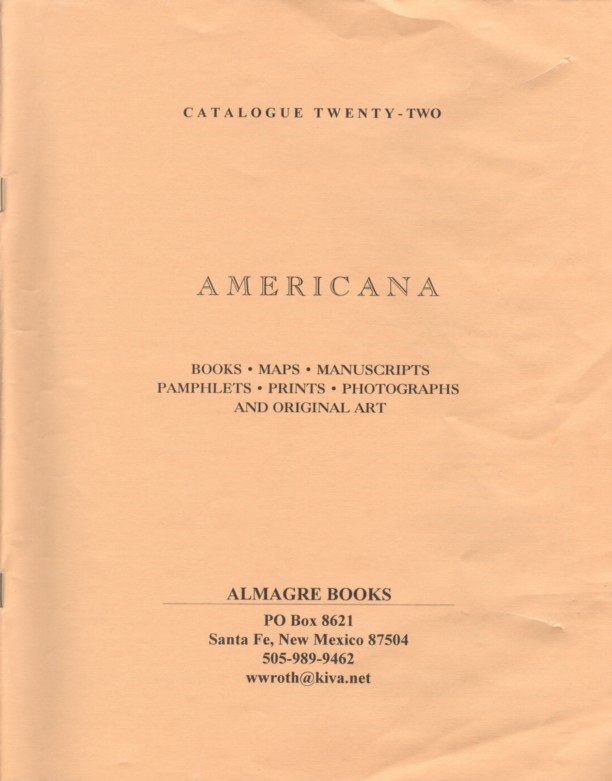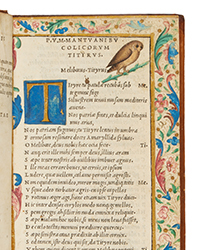Rare Book Monthly
Book Catalogue Reviews - June - 2007 Issue
A Wide Selection of Americana from Almagre Books
By Michael Stillman
Almagre Books, of historic Santa Fe, New Mexico, has issued its 22nd catalogue of Americana. There is really no way of describing this collection beyond that single term. The types of material offered include "books, maps, manuscripts, pamphlets, prints, photographs, and original art." However, the subject matter is as varied as America itself. Outside of the common thread of being works of nonfiction, you can find just about anything here. There is perhaps a skewing to the Southwest, but then you will find books on witchcraft in old New England. So, if you collect anywhere in the field of Americana, there is a good chance you will find something you like in the almost 600 items offered in this catalogue. Here are a few samples.
The 1830s were not a good time for America's natives. President Andrew Jackson may have been great for many things, but not his treatment of the Indians. Passage of the Indian Removal Act of 1830 signaled the end of all rights to their homeland for eastern Indians. The Cherokee of Georgia were the most notable victims of that decade, as they found their lands being taken by Georgia gold seekers and settlers. Most resisted, until they were finally forced on their "Trail of Tears" to Oklahoma, a death march for many. The Indians had far too few friends in Washington. John Marshall and the Supreme Court upheld their rights to their homeland, only to have their decision ignored by Jackson. Davy Crockett (the real one, not the Disney creation) was a strong supporter of the Indians. Another was Vermont Representative Horace Everett. He spent the decade arguing passionately for the Cherokee and other tribes, though to little avail. He described Indian removal as "evil," accurately predicting "the inevitable suffering incalculable." Item 104 is the Speech of Horace Everett, in the House of Representatives…May 31, 1838, on the Cherokee Treaty. Priced at $90.
Item 134 is a most unusual Colorado item, tying together perhaps the most notable family of the state's great mines and President Theodore Roosevelt. H.A.W. Tabor was at one time one of the nation's wealthiest people, amassing a fortune in the silver mines of Colorado. Though married at the time, he took up with a beautiful woman 25 years his junior, Baby Doe McCourt. While serving briefly as an appointed senator in Washington, he married Baby Doe, beginning a saga of wealth and generosity toward the community. The Tabors' home was in Leadville, high in the mountains. Unfortunately for the Tabors, the government demonetized silver in 1893, resulting in a collapse in the price of the metal. Tabor owned silver mines, and this, plus other bad investments, led to the loss of his entire fortune, perhaps $100 million. Broke, Tabor did manual labor before securing a job as postmaster in Denver in 1898. He died the following year, leading to the incredible saga of Baby Doe, who spent the rest of her life in poverty in a shack near Tabor's most notable, now abandoned mine. She was found there frozen to death in the winter of 1935. However, there was at least one bright spot in her long decline. In 1908, Theodore Roosevelt visited Colorado, and the Tabors' daughter, Rosemary Silver Dollar Echo Honeymoon Tabor, wrote a song for him.









